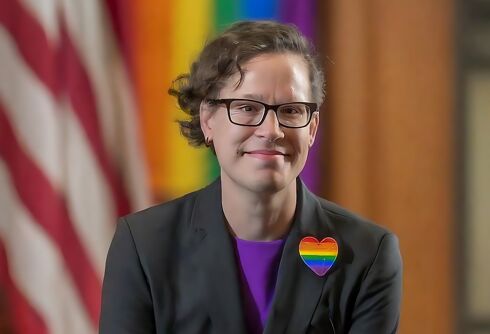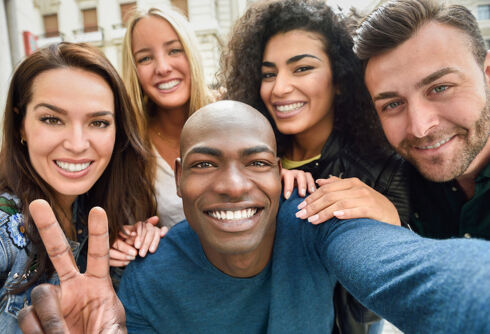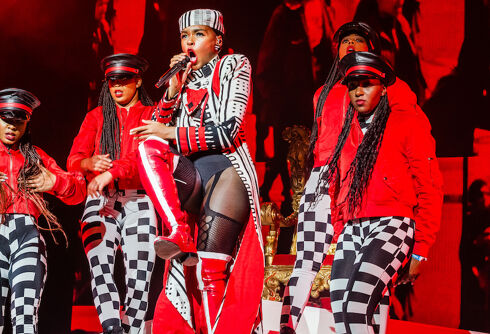“Hi! I’m Gene Robinson!”
The man grasped my hand warmly in the Billings airport, looking me directly in the eye, smiling, and — I’ll admit it — making me a little giddy.
Related:
Freedom fighter Desmond Tutu said he’d rather burn in hell than worship an anti-gay God
The iconic anti-apartheid leader said he felt as strongly about anti-LGBTQ discrimination as he did about fighting institutionalized racism.
Here was one of my heroes. Right in front of me. Smiling, shaking my hand. It may be hard to understand, but for a gay man, a former priest, a theologian and a man of faith, it was like Chris Christie meeting Colonel Sanders.
Never Miss a Beat
Subscribe to our newsletter to stay ahead of the latest LGBTQ+ political news and insights.
This man, the first openly gay ordained bishop in the history of Christendom has become something more than himself — and he realizes it. And he realizes it with such humility, cheer and even delight that it can’t help but be infectious. And he was so kind to me personally, even asking me to call him “Gene”.
But I couldn’t. Not yet.
Because I just love that he’s a bishop. Unashamedly, and perhaps even provocatively, he gets to wear the mantle of a religious leader as an openly gay man. I was going to call him “Bishop Robinson” as often as I could — just to remind myself (and the world) that there are gay people of faith, and that the Christian Church is not as intolerant as it is sometimes portrayed.
But for many of us, including myself, churches have been prominent places of pain and rejection. And when I realized my sexuality was an unwelcome “disorder” that I had never fully explored and that would never be adequately addressed by my remaining an active priest, I left.
It never left me, though.
I would be a priest today if I could live my life openly and honestly in the Catholic Church. I know — not realistic.
But I realized that I needed to find a place that would allow me to minister as myself- and I’ve finally found just such a place. The long and winding journey, and all the complicated feelings it has engendered, have brought me here. To a life of as much integrity as I can daily muster.
That’s what made this experience so powerful to me. Could I have been brave enough to do what this man did? Could I have been an agent of change within my church if I had stayed?
Maybe not, but I can certainly be inspired to do the best I can from here on out. Gene Robinson has greatly assisted that insight.
I sat down with Bishop Robinson for a quick interview in between events in Montana for the Fair Is Fair Campaign- organized by the Montana ACLU to promote fairness for LGBTIQ people across the state.
Bishop, I know you must be a busy man, what brings you to Montana, an out of the way place according to the scheme of things?
It’s my first visit to Montana, and I’m so delighted to be here!
You know, I spend a lot of time on the two coasts and in various places where sometimes LGBT issues are yesterday’s issue — usually where clear majorities of people are supportive. And while I enjoy that, and I believe in that work, here is where the real work of our time is.
I am always excited to be invited to places that are not as progressive- or at least don’t seem to be. I am always quick to point out to people that while statistically, we have a majority in favor of marriage around the country, it is not evenly distributed around the country. There are an awful lot of supportive people in San Francisco and LA and New York and Miami, but there are regions of the country for which that is not the case.
Last week I was in Lincoln, Nebraska with a bunch of wonderful people, just marvelous, and now I’m here in Billings. I’m very sensitive to and care about regions of the country where people are struggling- and I think we all need to be. I believe that this is where we need to be in order to move issues of equality forward.
Do your Kentucky roots have anything to do with your understanding of this particular issue?
Well, my Kentucky roots make me sensitive to these regions of the country where things are not so progressive, because they all remind me of home.
I think about my parents who were reasonably uneducated people and when I came out to them 27 years ago, they had no one to talk to about this. They had their own coming out process of having a gay son and virtually no support in doing so. I think that’s still true in lots of places.
So, while the concentrations of LGBT people might be on the two coasts, our parents and brothers and sisters are everywhere; they are people who are evenly distributed across the country. I think that there’s a lot of work to be done to support them — and all our allies — and make it possible for them to be openly advocating for us.
There’s got to be some interest on your part in trying to create some poignant message that’s not cliché or well worn that conveys a message that’s fresh and interesting to people of faith?
Well, a couple of things come to mind. I don’t want Montana to make the mistake that California made during the Prop 8 fight. They wrote off religious people as potential allies and I want to get the message across that there are progressive religious people — even in denominations that are not supportive — who can be tremendous allies in this struggle for equality.
Particularly in responding to and refuting religious arguments made against us. Even non-religious people are using religious arguments against us. People who haven’t been in church lately, or ever, all of a sudden are interested in quoting scripture.
I will say that there’s one thing about speaking in a place that’s working toward domestic partnerships (Montana is currently being sued for recognition of domestic partnerships): I want to find a way to say “Don’t settle for that.”
But I want to affirm the efforts of you all here. It’s still very important, but it’s even more important to not stop until everyone has the same rights. I want to be supportive of the strategic next step without taking our eyes off the prize of real, full equality.
I feel the need to remind people that this is not our end game. This is a step in the meantime until marriage equality is the law of the land.
As an activist, it sometimes is disheartening for me to hear the words “baby steps”. I don’t want to die before this kid grows up and starts to run. I wonder if you share in that frustration.
Well, in New Hampshire, we achieved legal civil unions in 2008. And I would say that it was positive as an intermediary step in that, when we were pressing for full marriage equality to be enacted in 2010, we were able to point to the last two years of civil unions and say to state legislators, “Remember all those terrible, draconian things you predicted when we got civil unions?
Like ‘the end of the world as we know it?’ Has anybody seen any of that happen?”
No one could point to any real change except greater happiness for citizens previously excluded from that happiness. I do think that there is usefulness to that intermediary step because it demonstrates to people that this is simply a way of offering greater societal support for gay families — a good thing for our society.
Any time we strengthen families should be a reason to celebrate in any community. There were just more happy citizens- without any of the terrible results predicted by the other side.
Do you consider yourself a married man, both in the eyes of society and the church?
Yes, absolutely. Although I must say, after referring to each other as partners for 23 years, it’s taken a little getting used to to refer to Mark as my husband. But we both believe that every time we do it, it’s a political statement, and it’s very important. I make a conscious effort to do it. If I catch myself saying “partner,” I immediately correct it verbally. But I don’t have to do that anymore, because it’s becoming more natural….
So how do you defend your marriage to Christians who may not accept it?
What I learned early on as an out gay man was that people’s acceptance to me was directly proportional to my acceptance of myself. I don’t make anybody acknowledge my marriage, I just operate as if it is the most normal thing in the world. And it’s amazing how people treat it as normal if you do.
Do you ever feel defensive?
Rarely. I rarely do.
That makes me happy to hear, but for people who live in rural America, that isn’t something we’ve been able to even entertain — for reasons of safety mostly. But I really want that to be possible here.
Right. And I do think you have to smart about it. I don’t want anyone to put themselves in danger, obviously. I wouldn’t lead with that about myself, but I’ve had 27 years to get used to it, and I’m not willing to sit on the sidelines. I also don’t think any of us need or want to be martyrs. But there’s a limit.
There’s nothing wrong with preserving your safety, but there’s a limit to how much you can use that as an excuse before it begins to damage your integrity. I think that’s different for each person. We all have different thresholds here.
On a little lighter note, what’s your guilty pleasure?
(Without missing a beat…) I would rather eat ice cream than breathe. And prior to going on my diet, I would have a minimum of a pint every night before going to bed. No wonder I needed to lose weight! (Bishop Robinson has recently lost over 20 pounds)
Being from New Hampshire, aren’t you personally acquainted with Ben and Jerry?
(Smiling) I actually have met them, yes.
Why do you not have your own flavor? I think we should start a campaign. What was your favorite flavor?
Actually, Ben and Jerry used to make a flavor that was my favorite of all time. It was only sold in their stores and not in supermarkets. It was coconut ice cream with almonds and chocolate — it was like an ice cream version of an Almond Joy. I think it was called Coconut Almond Fudge Chip, and they stopped making it. (sighs). They make something sort of like it, but it’s not the same. And I’m still grieving.
There would be no greater honor than if they resurrected that flavor and named it after me. I’d throw all the other awards away.
Having reached retirement age, I’m probably safe in asking this, but I’m curious: How do you feel about being an “elder” in a community that is often criticized as worshiping youth?
I know I enjoy being an elder in the community as long as that’s not interpreted as being retired from being in the community, or that I see these issues as any less pressing. In fact, one of my great concerns about the LGBT community is how little we know of our own history and the lives of those on the shoulders of whom we stand.
I remember when the movie “Milk” came out. There was a live interview with LGBT kids on the streets of Los Angeles. Not Billings, Montana (smiles), Los Angeles. It was an NPR interview and they were asking kids what Harvey Milk meant to them.
I don’t recall the exact numbers, but half of them didn’t know who Harvey Milk was, and the other half, for the most part couldn’t imagine how someone who died in the late 70’s could have anything to do with their lives whatsoever! A
nd I remember wanting to reach through the radio and grab them by the shoulders and shake them because they could no more be doing and saying and thinking the things they are but for the work of people like Harvey Milk. And if they don’t know Harvey Milk, they can’t possibly know about The Daughters of Bilitis or The Mattachine Society — or what the lives of the people at Stonewall were really like.
Our community is often criticized for being shallow, but that is often the most shallow thing about it- that we don’t care enough about our community to know and understand our history. It’s important that we honestly communicate our very different historical experience as elders to our youth. I think they may want to hear it from us.
As a bishop, what would you say to Christians in Montana (or anywhere) as a general rule before they consider speaking about LGBT people judgmentally?
The Bible in general and Jesus in particular seem to abhor arrogance and value humility. Christian people who are tempted to judge and condemn LGBT people, should pause for a moment and remember that the church used scripture to justify slavery and the denigration and subjugation of women. The church has gotten things wrong before. The question before them, and us, right now is “are you willing to consider the possibility that the church might have been wrong about LGBT people? Are you brave enough to consider that possibility?”
It is important strategically to pose it as a question. “Have we gotten it wrong?” Rather than “We’ve gotten it wrong.” Before anyone is going to believe it’s wrong, they have to be willing to consider the possibility. My job is to open people’s hearts to considering that.
Because once they go there, we’ve got ‘em. (He smiles broadly).
Bishop Gene Robinson is the Ninth Bishop of New Hampshire, a gay icon, ice cream lover and the author of God Believes In Love: Straight Talk About Gay Marriage. He’s also a delight to be with.
D Gregory Smith is a gay, HIV+ native Montanan, and Rome-educated former priest, who works as a mental health therapist. For more by D Gregory Smith, visit his blog From Eternity to Here.















